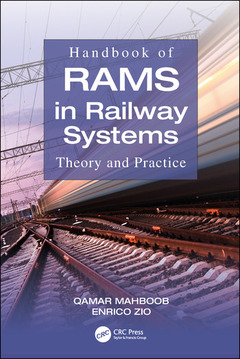Handbook of RAMS in Railway Systems Theory and Practice
Coordonnateurs : Mahboob Qamar, Zio Enrico

The Handbook of RAMS in Railway Systems: Theory and Practice addresses the complexity in today's railway systems, which use computers and electromechanical components to increase efficiency while ensuring a high level of safety. RAM (Reliability, Availability, Maintainability) addresses the specifications and standards that manufacturers and operators have to meet. Modeling, implementation, and assessment of RAM and safety requires the integration of railway engineering systems; mathematical and statistical methods; standards compliance; and financial/economic factors. This Handbook brings together a group of experts to present RAM and safety in a modern, comprehensive manner.
Basic Concepts, and Prediction and Estimation Techniques for RAMS. Introduction to the Requirements for Railway RAMS Management. Practical Statistics of RAMS Parameters. Basic Methods for RAM Analysis and Decision Making. Advance Methods for RAM Analysis and Decision Making. Framework for Risk and Decision Assessment in Engineering Systems. Methodologies for RAM and Safety Apportionment in Complex Railway Projects. Prognostics Management in Railways. Health Monitoring of Railway Assets within the Concept of RAMS. Human Factors in Railways and their Assessment. Introduction to IT Transformation of Safety and Risk Management Systems. Methods for Determining Safety Integrity Levels (SIL) in Railways. Maintainability Analysis Methods in Railways. CIFFA (Component, Interfaces and Functional Failure Analysis) for Combined and Improved Railway RAMS Assessment. Reliability Demonstration Tests: Decision Rules and Associated Risks. RAMS in Practice. Application of Risk Analysis Methods for Railway Level Crossing Problems. Methodology and Application of RAMS Management along the Railway Rolling Stock Lifecycle. Demonstration of Reliability and Availability in Guided Transportation Projects. Modeling Reliability Analysis of European Train Control System (ETCS). Systems Assurance for the Railway Electromechanical Products. Formal Reliability Analysis of Railway Systems using Theorem Proving. RAMS Considerations for MEP and ICT Systems for Railways. Estimation of Spare Parts based on RAMS Outputs. Decision Support for Maintenance Engineering: an Integrating Approach towards RAMS. Decision Support Systems for Railway RAMS: An Application from Railway Signaling. Maintainability Analysis in Railways: Practical Applications. Special Topics for RAMS. RAMS and Security. Optimal SIL Determination in Railways using a Utility-Based Approach. CENELEC Standards for Railway Signalling. The Role of Independent Assessor in RAMS Assessment. Managing SIL Certifications: A Guide for Product Suppliers and Product Owners. Application of the Code of Practices for RAMS Assessment: Real World Experience from the field of Rail Electrification. Importance of Safety Culture for RAMS. Railway Security: Policy, Law, and Regulation. Target Reliability Studies for New and Existing Railway Engineering Structures.
Dr. Engr. Qamar Mahboob has more than 15 years of project experience and several scientific publications in the field of Reliability, Availability, Maintainability and Safety.
Qualification: degrees (PhD in Railway Risk, Safety and Decision Support from TU Dresden, Germany), (MSc. Transportation Systems form TU Munich, Germany), (MS Total Quality Management from Punjab University Lahore), (BSc. Mechanical Engg. from UET Lahore), (B-Tech from GCT Lahore) Experience: (Pakistan Railways, Maintenance Engineer for rolling stock), (Engineering Risk Analysis Group of TU Munich, Scientific researcher), (Chair of Railway Signalling and Transport Safety Technology of TU Dresden, Scientific researcher), (CERSS.com, RAMS Consultant), (Siemens AG, Germany, Key Senior Expert for RAMS) (HI-TEK Manufacturing Pvt. Ltd. Lahore, Technical Lead), (KKPower International Pvt. Ltd. Lahore, Services Manager), (SEATS Lahore, Director and CTO).
E-mail: qamarmahboob.pk@gmail.com
Prof. Dr. Enrico Zio (M'06–SM' 09) received the MSc degree in nuclear engineering from Politecnico di Milano in 1991 and in mechanical engineering from UCLA in 1995, and the Ph.D. degree in nuclear engineering from Politecnico di Milano and MIT in 1996 and 1998, respectively. He is currently Director of the Chair on Systems Science and the Energetic Challenge of the Foundation Electricite' de France (EDF) at CentraleSupélec, Paris, France, full professor and President of the Alumni Association at Politecnico di Milano, adjunct professor at University of Stavanger, Norway, City University of Hong Kong, Beihang University and Wuhan University, China and Co-Director of the Center for REliability and Safety of Critical Infrastructures (CRESCI), China, visiting professor at MIT university, Massachusetts, USA, Distinguished Guest Professor, Tsinghua University, Beijing, China. His research focuses on the modeling of the failure-repair-maintenance behavior of components and complex sy
Date de parution : 03-2018
17.8x25.4 cm
Disponible chez l'éditeur (délai d'approvisionnement : 14 jours).
Prix indicatif 244,87 €
Ajouter au panierThèmes de Handbook of RAMS in Railway Systems :
Mots-clés :
UK Rail Industry; risk and decision assessment in engineering systems; Reliability Block Diagrams; Prognostics management; SIL; Health monitoring of railway systems and subsystems; Cumulative Distribution Function; Human factors in railways and their assessment; European Train Control System; Railway security policy; European Rail Traffic Management System; law & regulations; THRs; maintainability analysis; UK Rail; European Train Control System (ETCS); Ram Analysis; Human factors in railways; Rolling Stock Operator; CIFFA (Component; Interfaces and Functional Failure Analysis); Constant Failure Rate; SIL Certifications; Nonhomogeneous Poisson Process; signalling systems; Train Control System; Modelling reliability analysis; Railway Vehicles; Enrico Zio; Discrimination Ratio; Pierre Dersin; Life Cycle Phases; Andreas Joanni; Functional Safety; Holger Schult; Minimum Cut Sets; Hendrik Schäbe; Safety Case; Allegra Alessi; PNs; Olga Fink; RBD Model; Benjamin Lamoureux; Ram Requirement; Mehdi Brahimi; Theorem Provers; Birgit Milius; Cross Acceptance; Jens Braband; Homogeneous Poisson Process; Cristian Maiorano; Ruben Zocco; Rohan Sharma; Simone Finkeldei; Thomas Grossenbacher; Kyoumars Bahrami; Vidhyashree Nagaraju; Lance Fiondella; Alessandro Fantechi; Alessio Ferrari; Stefania Gnesi; Joerg Schuette; Heinz Gall; Miroslav Sykora; Dimitris Diamantidis; Milan Holicky; Karel Jung; Yiliu Liu; Lei Jiang; Alban Péronne; René Valenzuela; Min An; Yao Chen; Peter Wigger; Georg Edlbacher; Datian Zhou; Ali Hessami; Xiaofei Yao; Eric J; Schöne; Malcolm Terry Guy Harris; Jeremy F; Plant; Gary A; Gordon; Richard R; Young; Coen van Gulijk; Miguel Figueres-Esteban; Peter Hughes; Andrei Loukianov; Waqar Ahmad; Osman Hasan; Sofiène Tahar; Attilio Ciancabilla; Stephan Griebel


